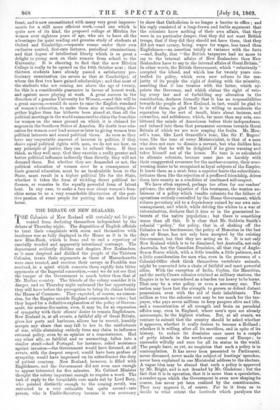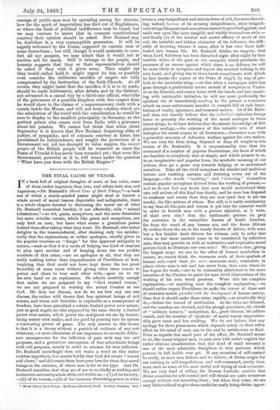THE DEBATE ON NEW ZEALAND.
THE 6olonists of New 2egana will cerLaledy ilot be pre- vented from declaring themselves independent by the debate of Thursday night. The disposition of English officials• to treat their complaints with scorn and themselves with insolence was as fully displayed in the House as it is in the new Blue-Book, which is from end to end a repertory of carefully worded and apparently intentional contempt. The department evidently dislikes and despises New Zealanders, as it once despised and disliked the people of the Thirteen Colonies, treats their arguments as those of Massachusetts were once treated, and receives their envoys as Franklin was received, in a spirit which converts them rapidly into bitter opponents of the Imperial connection,—and we do not see that the temper of the Government is much better than that of Mr. Mother country. The friends of the colony consider it in danger, and on Thursday night embraced the last opportunity they will have before the prorogation to bring its claims before the House of Commons. They expected, of course, no conces- sion, for the Empire outside England commands no votes ; but they hoped for a definitive explanation of the policy of Govern- ment, for serious discussion, even, it may be, for an expression of sympathy with their clients' desire to remain Englishmen. New Zealand is, at all events, a faithful ally of Great Britain, gives her ports and harbours, allows her to recruit, humbly accepts any share that may fall to her in the misfortunes of war' while abstaining entirely from any claim to influence external policy, even by an opinion or a remonstrance. Had any other ally, so faithful and so unexacting, fallen into a similar strait—had Portugal, for instance, asked assistance against invasion—the Government would have listened, at all events, with the deepest respect, would have been profuse of sympathy, would have impressed on its subordinates the duty of patient courtesy. New Zealand, however, is filled with Englishmen, and the Government did not even care enough to appear interested for five minutes. No Cabinet Minister thought the colony important enough to require a word. The task of reply to the formidable case made out by Lord Bury, who pointed distinctly enough to the coming revolt, was entrusted to a very estimable but quite second - rate person, who is Under-Secretary because it was necessary
to show that Catholicism is no longer a barrier to office ; and his reply consisted of a long-drawn and feeble argument that the colonists knew nothing of their own affairs, that they were in no particular danger, that they did not want British troops, that if they did they should not have them, that they did not want money, being, wages for wages, less taxed than Englishmen—an assertion totally at variance with the facts —and, finally, that "the British taxpayers had no more to say to the internal affairs of New Zealanders than New Zealanders have to say to the internal affairs of Great Britain." In other words, the British Government, which " reluctantly " accepted the island, an,d which has for twenty years con- trolled its policy, which even now refuses to the ma- jority of its people the right of dealing with the minority, asserting that it has treaties with the latter, which ap- points the Governor, and which claims the right of veto- ing every law and of forbidding any alteration in the constitution, declares formally that it has no responsibilities towards the people of New Zealand, in fact, would be glad to be rid of them, so glad that it is willing to accelerate the separation by the sort of insult, hints about laziness, and cowardice, and selfishness, which, far more than any acts, em- bittered the minds of Americans before their independence, and infused into them that permanent soreness towards Great Britain of which we are now reaping the fruits. Mr. Mou- sers tone, like Lord G-ranville's tone, like Sir F. Rogers' tone, like the tone of every Ministerialist, is that of a man who does not care to dismiss a servant, but who dislikes him so much that he will be delighted if he gives warning and takes himself out of the house. No tone is so calculated to alienate colonists, because none jars so harshly with their exaggerated reverence for the mother-country, their over- weening desire to be recognized as loyal subjects of the Empire. It hurts them as a snub from a superior hurts the subordinate, irritates them like the rejection of a proffered friendship, drives them into enmity as a condition of continued self-respect. We have often exposed, perhaps too often for our readers' patience, the utter injustice of this treatment, the wanton un- fairness of a policy which insults colonists for the failure of operations entirely controlled by the Home Government, which refuses pecuniary aid to a dependency ruined by our own mis- management, and which, while driving the whites to a war of extermination, declares that it does so in the guaranteed in- terests of the native population ; but there is something worse than all this. It is clear that Mr. Goldwin Smith's colonial "policy," the policy, that is, of shaking off the Colonies as too burdensome, the policy of Honoring in the last days of Rome, has not only been accepted by the existing Government, but that they are acting on it. It is not only New Zealand which is to be dismissed, but Australia, not only Australia, but the Canadian Dominion, all that ring of Anglo- Saxon States which, with a little trouble, a little patience, and a little consideration for men who, even in the presence of a Colonial-Office clerk think themselves vertebrate animals, might be converted into a chain of faithful and most powerful allies. With the exception of India, Ceylon, the Mauritius, and the costly Crown colonies retained as military stations, the Empire is to be surrendered as a burden too heavy to be borne. That may be a wise policy, or even a necessary one. The nation may have lost the strength to govern or defend distant possessions, even with the aid of their inhabitants. The million or two the colonies cost may be too much for the tax- payer, who pays seven millions to keep paupers alive and idle, and a concentration of all strength and brain on parochial affairs may, even in England, where men's eyes are already microscopic, be the highest wisdom. But, at all events, we venture to submit that the country should be asked whether it approves, whether it really desires to become a Holland ; whether it is willing, after all its sacrifices, and in spite of its history, to reduce its dominion once more to a couple of petty islands in the north-west corner of Europe; to surrender wilfully and once for all its status in the world. The people have, as yet, no suspicion that such a policy is in contemplation. It has never been presented to Parliament, never discussed, never made the subject of hustings' speeches, never been explained in one Ministerial address to the electors. A vague idea may be abroad that such a policy is approved by Mr. Bright, and is not dreaded by Mr. Gladstone ; but the fact that it is in operation, that it is more than a speculation, a resolve upon which the Government is even now shaping its course, has never yet been realized by the constituencies. They may approve it, of course. Far be it from us to decide to what extent the lassitude which paralyzes the
courage of public men may be spreading among the electors, how far the spirit of imperialism has died out of Englishmen, or where the limit of political indifference may be found, but we may venture to assert that in common constitutional courtesy their opinion should be asked. New Zealand may be, doubtless is, a very contemptible possession. It will be eagerly welcomed by the Union, supposed to contain men of some shrewdness ; but still, though it would maintain in com- fort all our paupers, we may admit that it would not at auction sell for much. Still it belongs to the people, and honesty suggests that they or their representatives should be asked if they wish it given away. They might say they would rather hold it, might regret its loss, or possibly even consider the deliberate sacrifice of empire not fully compensated by the destruction of the Irish Church. At all events, they might insist that the sacrifice, if it is to be made, should be made deliberately, after debate, and by the Cabinet, not advanced in a casual way by a third-rate official, who talks of the grievances of a possible kingdom with less respect than he would show to the claims of a supernumerary clerk with a cousin inside the House, and will not treat colonies which are the admiration of the world with the consideration he would be sure to display to the smallest principality in Germany, or the pettiest prince who comes over from India with a grievance about his pension. We cannot but think that when about September it is known that New Zealand, despairing alike of justice, of sympathy, and of common courtesy at home, has proclaimed its independence, and sought the protection of a Government not yet too decrepid to value empire, the amour propre of the British people will be wounded as since the Peace of Utrecht it has never been wounded yet ; that even this Government, powerful as it is, will wince under the question "What have you done with the British Empire I"































 Previous page
Previous page